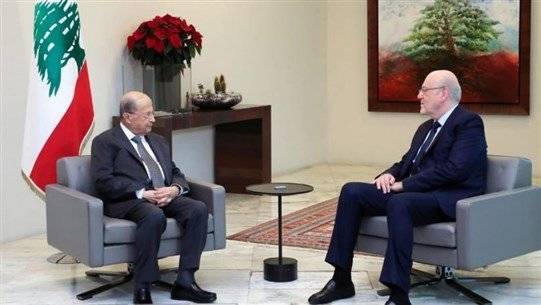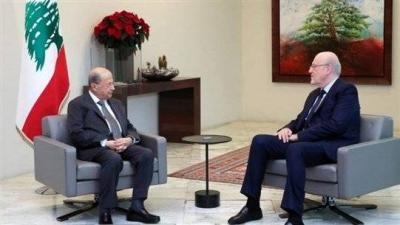In the domestic scene, and as all movements related to the government situation ceased yesterday, sources following the governmental file and familiar with the stance of the presidency indicated that the meeting between President Michel Aoun and Prime Minister-designate Najib Mikati, held the day before yesterday, did not bring any new developments regarding the issue of government formation. The positions remain unchanged concerning the awaited governmental formula.
The discussions between Presidents Aoun and Mikati touched upon topics related to governmental work and the fate of several decrees that are still frozen, obstructing a number of important issues such as the formation of the Court of Cassation and the appointment of deans of the Lebanese University. The sources noted that the matter of forming the government still revolves around the number of ministers in the governmental structure, with Aoun having suggested to the Prime Minister-designate to increase the number of ministers by six compared to the structure previously presented by Mikati, which had already received approval from the Prime Minister-designate.
In this context, the sources considered that Aoun's proposal to increase the ministers by six was "not aimed at ensuring the President's team a guaranteed third in the government, nor at obstructing the formation process, but rather the goal is multifaceted. Primarily, Aoun is convinced of the necessity to ensure political immunity for a technocratic government that enables it to face upcoming challenges, most notably the maritime border demarcation and the approval of reforms in the economic recovery plan, among others."
The second reason highlighted is that Aoun believes the experience of the current government, as well as that of former Prime Minister Hassan Diab's government, which included technocratic ministers, was not encouraging due to the lack of support from the political blocs represented within them, leading to a decline in the necessary political cover. Political blocs even directed numerous criticisms at the inability of technocratic ministers to address the political aspects of governmental work.
Additionally, the sources point out that "the absence of this political cover was leading, every time essential issues were raised in the Council of Ministers, to the suspension of discussions and hence decision-making until the technocratic ministers referred back to their political references to inquire about their positions on the issues raised. However, if these political leaders were represented through the six ministers, Aoun believes it would be possible to expedite decision-making immediately without any delays for consultation outside the Council of Ministers."
Furthermore, these sources opine that "the prospective government needs direct political representation through the six ministers, especially if a presidential vacuum occurs due to the inability to elect a president for any reason, since the government would collectively assume the powers of the President of the Republic in such a scenario, making the need for political representation in the government pressing and essential."
The same sources add that "any interpretations given regarding Aoun's demand for six political ministers, from any party or reference, do not align with the reality that requires a responsible national approach during this critical phase of the country's history, away from personal calculations and considerations that have surfaced recently, as political support for the new government is an essential need now, given that the country is undergoing a critical and fateful period that should not be treated with leniency or indifference."




